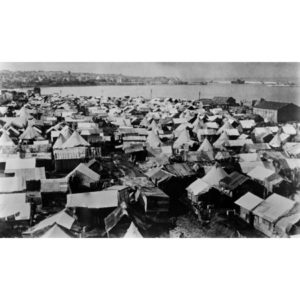Learning what it’s like to be poor – Donna Ross
When we moved into our Beirut apartment in 1967, we had two babies and an awful lot of cloth diapers to wash. My parents sent us money to buy a washing machine, and we hung the diapers up to dry in our little breezeway. Soon, for very little money, we hired a Lebanese woman who came three mornings a week to clean our little apartment and wash our dusty tile floors. How little I knew about her home life, but what luxury it was to have help!
We didn’t have a car, but neighbors invited us to go on Saturday trips. So the nine of us – four adults, two little girls, and three baby boys – would rattle around the Lebanese coast and mountains in an old Volkswagen bus.
Whether our destination was to the north or the south, every trip out of Beirut led past Palestinian refugee camps. The refugees’ extreme poverty was very clear through the windows of our suddenly-palatial bus: Here were families living in hovels, under corrugated tin roofs if they were lucky; here were families without dry clothing in Lebanon’s heavy rains; here were families receiving their daily food and water from the U.N.; and here were young men growing up in a kind of prison – denied citizenship and therefore denied jobs, they were growing more angry every day.
Years later, when I was in seminary, I discovered that my New Testament professor had spent many years as the pastor of a church in Jerusalem. One night we invited him to our home for a Lebanese supper. We all shared memories of our years spent in the eastern Mediterranean. Watching him eat his meal with great enthusiasm, scraping his lahm mashwi off its skewer and dipping his pita bread into the hummus, we discovered that he spoke fluent Arabic. We asked him where he had learned the language.
“Oh,” he said, “I spent nine months living in a refugee camp on the edge of Beirut.”

Some of us glance out our windows at extreme poverty, then turn our heads away. Some of us see the struggles of the poor, and are moved to try to help. But very few of us are willing to live with the poor, even becoming poor so we can live the lives they live.

